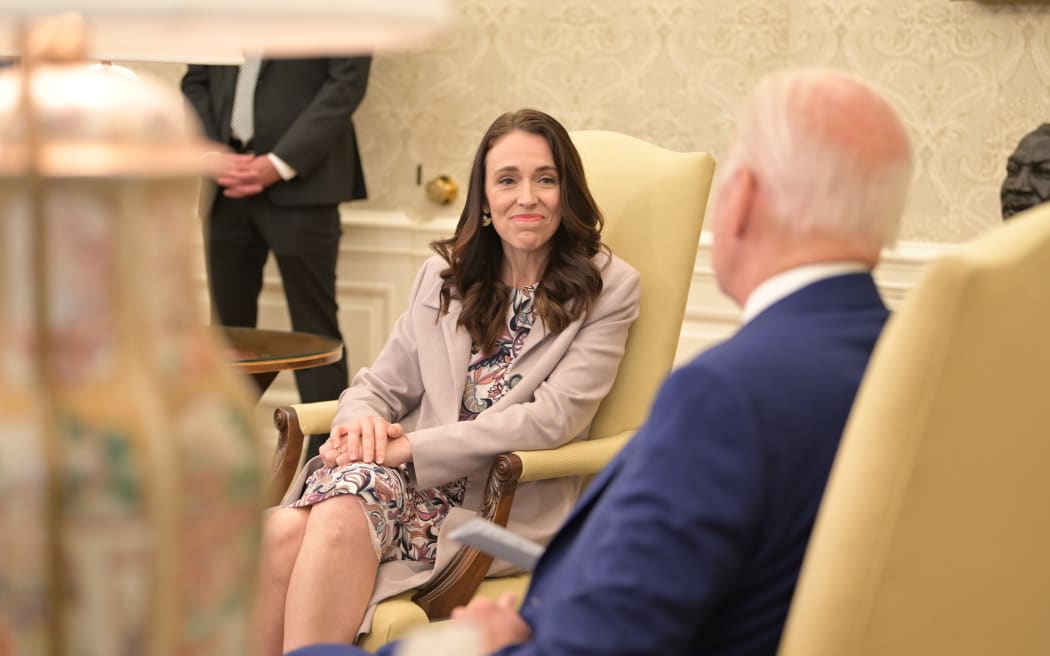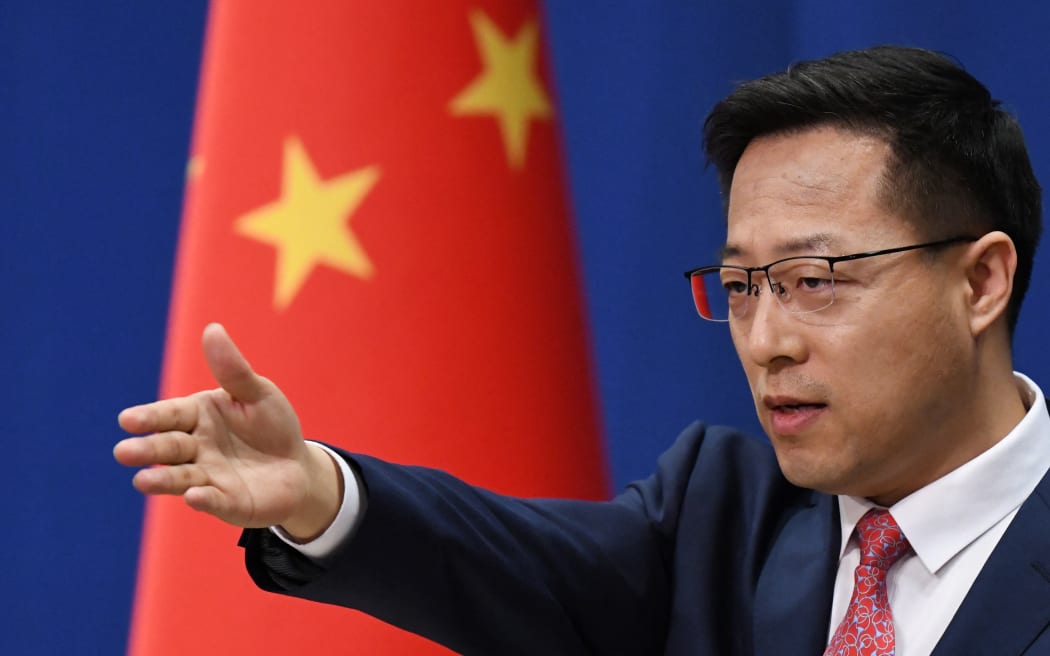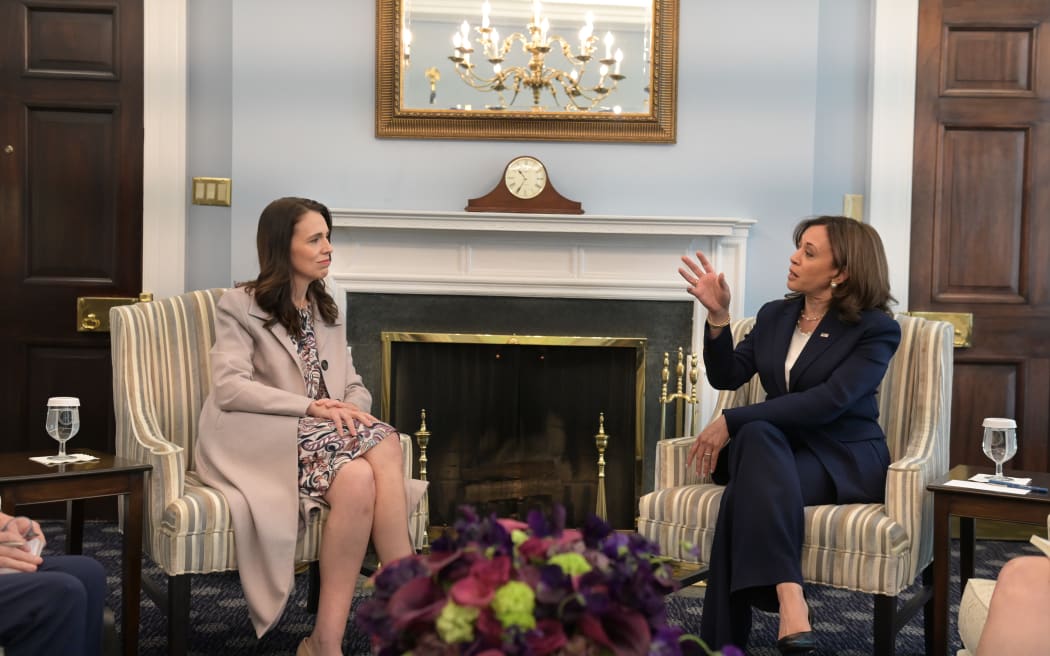Power Play - The Prime Minister's historic visit to the White House was well overdue, but comes at a time when New Zealand needs to be drawing clear battle lines between friend and foe.
It's been a tricky juggle balancing the relationships with the United States and China - a newer one, but crucial to New Zealand's economy.

Prime Minister Jacinda Ardern meets with US President Joe Biden at the White House Photo: Pool / Joy Asico/Asico Photo
"To the people of New Zealand: if you ever need a friend, you have one."
This promise, quoting the inscription on the Marine Corps Memorial plaque in Wellington, concluded the joint statement issued by New Zealand and the United States after Prime Minister Jacinda Ardern and President Joe Biden met.
The joint missive represents a tipping in the balance of New Zealand's foreign policy, back towards Western alliances and traditional partnerships.
Invoking a "unique partnership" and 80-year "history of shared resolve in the face of aggression" dating back to World War II, they state their "concern with growing strategic competition in the Pacific region, which threatens to undermine existing institutions and arrangements that underpin the region's security".
READ MORE
- Chinese Ambassador says NZ-US statement raised in Nanaia Mahuta meeting after minister skirts questions
- 'Smearing and demonising': China hits out at NZ after Ardern and Biden's 'shared concerns'
- Ardern, Biden meeting: Expert analyses their body language during meeting at the White House
- Jacinda Ardern says meeting with President Joe Biden was 'warm and "friendly'
Then, straight into a list of flashpoints specifically connected to China: the South China Sea, Hong Kong, Taiwan and "human-rights violations" in Xianjiang.
The threat of increased Chinese influence in the Indo-Pacific, alongside North Korean and Russian aggression, "demands new resolve and closer co-operation" between New Zealand and the US, they declare.
China's response was fierce, saying the statement "distorts and smears China's normal cooperation with Pacific Island countries, deliberately hypes up the South China Sea issue, makes irresponsible remarks on and grossly interferes in China's internal affairs".
China foreign spokesperson Zhao Lijian said the agreement with Solomon Islands did "not target any third party, nor does it intend to establish a military base".
"The hype-up of relevant issues in the joint statement by the US and New Zealand is out of ulterior motives to create disinformation and attack and discredit China," he said.

Chinese Foreign Minister spokesperson Zhao Lijian Photo: AFP
He urged the US to "abandon its Cold War mentality and ideological bias, stop interfering in China's internal affairs and stop slandering and discrediting China" - another salvo in the ongoing war of words.
And for New Zealand, a hope it will "adhere to its independent foreign policy and do more to enhance security and mutual trust among regional countries and safeguard regional peace and stability".
America is coalition building; worried at the willingness of a host of smaller countries to open the door to China. It has been spurred into action by China's intensive efforts to sign Pacific nations up to agreements spanning trade, disaster relief, the pandemic response and security.
While New Zealand is a tiny country in the scheme of things, it holds a unique position in the battle of the superpowers. It has an established relationship with China and is a key player in the grouping of Pacific countries. With long and deep connections to its closest neighbours, it could prove to be a useful broker, one the reasons - despite major logistical challenges - this week's White House meeting took place.
The US, Australia and even New Zealand must step carefully, lest their efforts to dissuade Pacific countries from cosying up to China are seen as heavy-handed and condescending. Biden addressed it directly when sitting in the Oval Office with Ardern: "We are not coming to dictate or lay down the law".
She too has been at pains to acknowledge Pacific countries can decide when and with whom they strike agreements, but with pointed reminders about regional security arrangements that have been in place for decades.
Ardern did what she intended to do in the States; leverage her international profile to relentlessly tout New Zealand as open for business, open doors for local business interests and foster key personal and political relationships - most importantly with the American President. While her personal ratings are on the slide back home, her reception stateside was generally enthusiastic; it did help many of those she met were of the same political stripe, and welcomed the contrast she presented against other elements of US politics.
A Washington insider said she had made an impression on Capitol Hill and at the White House, as well as valuable face time with potential presidential candidates on the left of US politics: Vice President Kamala Harris and California Governor Gavin Newsom.

Prime Minister Jacinda Ardern with US Vice President Kamala Harris at the White House. Photo: Joy Asico / Asico Photo
Internal ructions have delayed the upcoming Pacific Islands Forum where the stakes are higher than ever. New Zealand wants to go to Fiji and talk to Pacific leaders directly about what's happening in the region - the China-Solomons security deal in particular.
There's been little engagement from the Solomons after New Zealand asked for details of the country's agreement with China and how it might affect regional neighbours; it's pinning hopes on making progress once leaders can sit down and thrash it out in person.
President Biden is also due to address the Forum. No prizes for guessing what his pitch will be.




